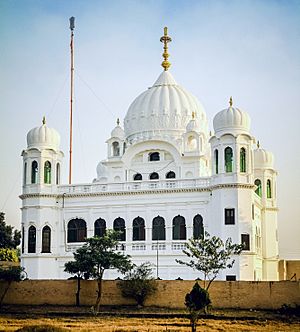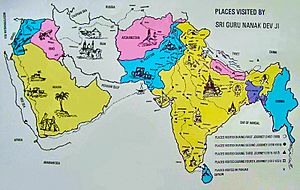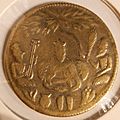Guru Nanak facts for kids
Quick facts for kids Guru Nanak |
|
|---|---|
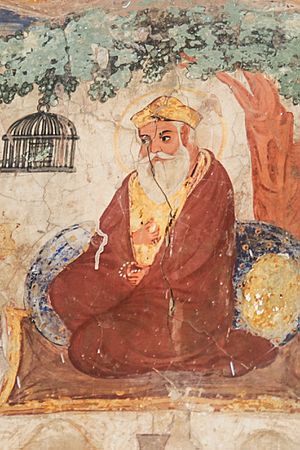
19th-century mural painting from Gurdwara Baba Atal depicting Nanak
|
|
| Religion | Sikhism |
| Known for | Founder of Sikhism |
| Other names | First Master Peer Balagdaan (in Afghanistan) Nanakachryaya (in Sri Lanka) Nanak Lama (in Tibet) Guru Rinpoche (in Sikkim and Bhutan) Nanak Rishi (in Nepal) Nanak Peer (in Iraq) Vali Hindi (in Saudi Arabia) Nanak Vali (in Egypt) Nanak Kadamdar (in Russia) Baba Foosa (in China) |
| Personal | |
| Born | Nanak 15 April 1469 Rāi Bhoi Kī Talvaṇḍī, Delhi Sultanate (present-day Nankana Sahib, Punjab, Pakistan) |
| Died | September 22, 1539 (aged 70) Kartarpur, Mughal Empire (present-day Punjab, Pakistan) |
| Resting place | Gurdwara Darbar Sahib Kartarpur, Kartarpur, Pakistan |
| Spouse | Mata Sulakhani |
| Children | Sri Chand, Lakhmi Das |
| Parents | Mehta Kalu and Mata Tripta |
| Religious career | |
| Based in | Kartarpur |
| Successor | Guru Angad |
| Signature | 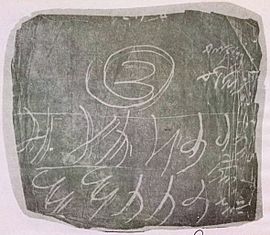 |
Guru Nanak (born April 15, 1469 – died September 22, 1539) was the founder of Sikhism. He is known as the first of the ten Sikh Gurus. People around the world celebrate his birthday as Guru Nanak Gurpurab. This special day falls on the full moon of the Kattak month, usually in October or November.
Nanak traveled widely across Asia. He taught people about Ik Onkar, which means "one God." He believed this one God lives in everyone and everything. Guru Nanak created a unique way of life. It was based on equality, love for others, goodness, and strong values.
His teachings are written in 974 poetic hymns, called shabda. These are found in the holy book of Sikhism, the Guru Granth Sahib. Some important prayers include the Japji Sahib, the Asa di Var, and the Sidh Gosht. Sikhs believe that Nanak's spiritual power passed on to the nine Gurus who followed him.
Contents
Guru Nanak's Life Story
Birth and Early Years
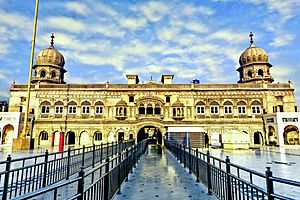
Nanak was born on April 15, 1469. His birthplace was Rāi Bhoi Kī Talvaṇḍī village. This area is now called Nankana Sahib in Pakistan. Most traditional stories about Nanak's birth, called janamsakhis, agree on this date. These stories say he was born in the month of Baisakh (April). Sikh records also show he died at 70 years old. This matches an April birthdate.
Some people celebrate his birthday in November. This tradition started later, around the 19th century. One reason might be that November was a better time for people to gather. Many other festivals happened in April. Also, farmers had more money to donate after their harvest in November.
Family and Childhood
Nanak's parents were Mehta Kalu and Mata Tripta. They were Hindu merchants. His father worked as a village accountant. Sikh traditions say Nanak's early life showed he had special divine gifts. From a young age, he was interested in spiritual topics.
At age seven, Nanak went to school. Stories say he amazed his teacher. He explained that the first letter of the alphabet meant the oneness of God. Other tales tell of miracles. Once, a cobra or a tree's shadow protected him from the sun while he slept.
Nanak's only sister, Bebe Nanaki, was five years older. She married in 1475 and moved to Sultanpur Lodhi. Her husband, Jai Ram, helped Nanak get a job there. Nanak started working at a storehouse around age 16.
As a young man, Nanak married Sulakhani on September 24, 1487. They had two sons, Sri Chand and Lakhmi Chand. Nanak lived in Sultanpur until about 1500. This time was very important for his spiritual growth.
Later Life and Passing
Around age 55, Nanak settled in Kartarpur. He lived there until his death in September 1539. During this time, he made short trips to spiritual centers. By the time he passed away, Nanak had many followers in the Punjab region.
Guru Nanak chose Bhai Lehna as his successor. He renamed him Guru Angad, meaning "part of you." Guru Nanak passed away on September 22, 1539. He was 70 years old. Sikh stories say his body was never found. When Hindus and Muslims argued over his final rites, they found only flowers under the sheet. This showed how his simple faith grew into a religion.
Spiritual Journeys (Udasis)
In the early 1500s, Nanak went on long spiritual journeys called udasiya. He visited many places, including major Hindu and Muslim holy sites. Some modern stories say he traveled to Tibet, much of South Asia, and Arabia. These journeys supposedly lasted 30 years.
These stories mention Nanak visiting places like Mecca and Baghdad. He would debate religious ideas with different groups. These travel stories became very popular in the 19th and 20th centuries.
However, some scholars question how accurate these travel stories are. Early Sikh texts do not mention such extensive travels. These stories often appeared centuries after Nanak's death. They became more detailed over time. Some scholars believe these legends might have been created to compete with similar miracle stories in other religions.
For example, a stone inscription in Baghdad has been debated. Some say it shows Guru Nanak was there in the early 1500s. Others argue the stone is from the 19th century. There is no other evidence of Nanak's journey to the Middle East in historical records.
Teachings and Legacy
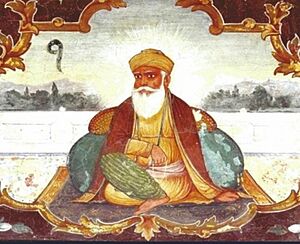
Guru Nanak's teachings are found in the Guru Granth Sahib. They are a collection of verses written in Gurmukhi.
Many Sikhs believe Nanak's message came directly from God. His own words in the Guru Granth Sahib suggest this. A key event in his life supports this belief. He returned after three days with a special spiritual understanding.
Nanak taught that all people can connect with God directly. They do not need rituals or priests. He emphasized that spiritual life and daily life are connected. He believed that living an "active, creative, and practical life" was very important. This life should be full of "truthfulness, self-control, and purity."
Nanak's teachings are often understood in three main ways:
- Vand Shhako: Share with others and help those in need.
- Kirat Karo: Earn an honest living without cheating anyone.
- Naam Japo: Meditate on God's name to feel His presence.
Guru Nanak's Impact
Guru Nanak Dev Ji founded Sikhism. The main beliefs of Sikhism are found in the Guru Granth Sahib. These include faith in one creator and meditating on His name. Sikhism also teaches about the unity of all people. It encourages selfless service and working for social justice. Sikhs believe in honest living while being part of a family and community.
The Guru Granth Sahib is the highest authority in Sikhism. It is seen as the final and eternal Guru. Guru Nanak contributed 974 hymns to this holy book.
Influences on Guru Nanak
Many Sikhs believe Guru Nanak's message was a divine revelation. His own writings in the Guru Granth Sahib state that his teachings came from the Creator. A key event in his life, where he gained enlightenment, also supports this belief.
Some historians link Nanak's teachings to older Indian traditions. These include the bhakti movement and the sant tradition. These traditions focused on a "formless God." However, some historians argue that Sikhism is not just an extension of these movements. Sikhism had its own unique ideas.
Places Visited
India
- Gurudwara Reetha Sahib, Champawat
- Nanakmatta
- Gurudwara Pehli Patshahi Guntur
- Gurdwara Sri Guru Nanak Sheetal Kund – Rajgir
- Patna
- Gurdwara Nanak Piao, Delhi
- Gurudwara Majnu Ka Tila, Delhi
- Gurdwara Pehli Patshahi, Lakhpat
- Panipat
- Hari Parbat, Srinagar
- Gurudwara Shri Ber Sahib, Sultanpur Lodhi
- Gurudwara Shri Hatt Sahib, Sultanpur Lodhi
- Gurudwara Shri Kothri Sahib, Sultanpur Lodhi
- Gurudwara Shri Guru Ka Bagh, Sultanpur Lodhi
- Gurudwara Shri Sant Ghat, Sultanpur Lodhi
- Gurudwara Shri Antaryamta, Sultanpur Lodhi
- Dera Baba Nanak
- Gurudwara Manji Sahib, Kiratpur Sahib
- Achal Batala
- Gurudwara Nanak Lama, Chungthang
- Gurudongmar Lake
- Gurdwara Guru Nanak Datan Sahib, Cuttack
- Gurdwara Bauli Math Sahib, Puri
Pakistan
- Nankana Sahib
- Gurdwara Darbar Sahib Kartarpur, Kartarpur
- Gurdwara Sacha Sauda, Farooqabad
- Sultanpur Lodhi
- Gurdwara Rori Sahib, Gujranwala
- Gurdwara Beri Sahib, Sialkot
- Gurdwara Panja Sahib, Hasan Abdal
- Gurudwara Chowa Sahib, Rohtas Fort
- Narowal
Other Countries
- Gurdwara Nanak Shahi, Dhaka, Bangladesh
- Gurduara Baba Nanak Dev Ji, Jalalabad, Afghanistan
- Chashma Sahib Patshahi Pahili, Jalalabad, Afghanistan
- Gurudwara Pehli Patshahi, Mashhad, Iran
- Baba Nanak Shrine, Baghdad, Iraq
- Gurudwara Pehli Patshahi Batticaloa, Sri Lanka
- Koti, now known as Kotikawatta, Sri Lanka
- Mecca, Saudi Arabia
- Medina, Saudi Arabia
Images for kids
-
Hindus and Muslims disputing over the final rites of Guru Nanak. 19th century fresco from Gurdwara Baba Atal, Amritsar.
-
The abandoned Gurudwara Chowa Sahib, located near the Rohtas Fort in Pakistan, commemorates the site where Guru Nanak is popularly believed to have created a water-spring during one of his udasis.
-
Guru Nanak's handprint is believed to be preserved on a boulder at the Gurdwara Panja Sahib in Hasan Abdal, Pakistan.
-
Mural of Guru Nanak from a Hindu temple in Jammu.
See also
 In Spanish: Gurú Nanak Dev Ji para niños
In Spanish: Gurú Nanak Dev Ji para niños
- Nanakpanthi
- Fatehabad, Punjab
- List of places named after Guru Nanak Dev
- Bebe Nanaki
- Guru Gobind Singh


